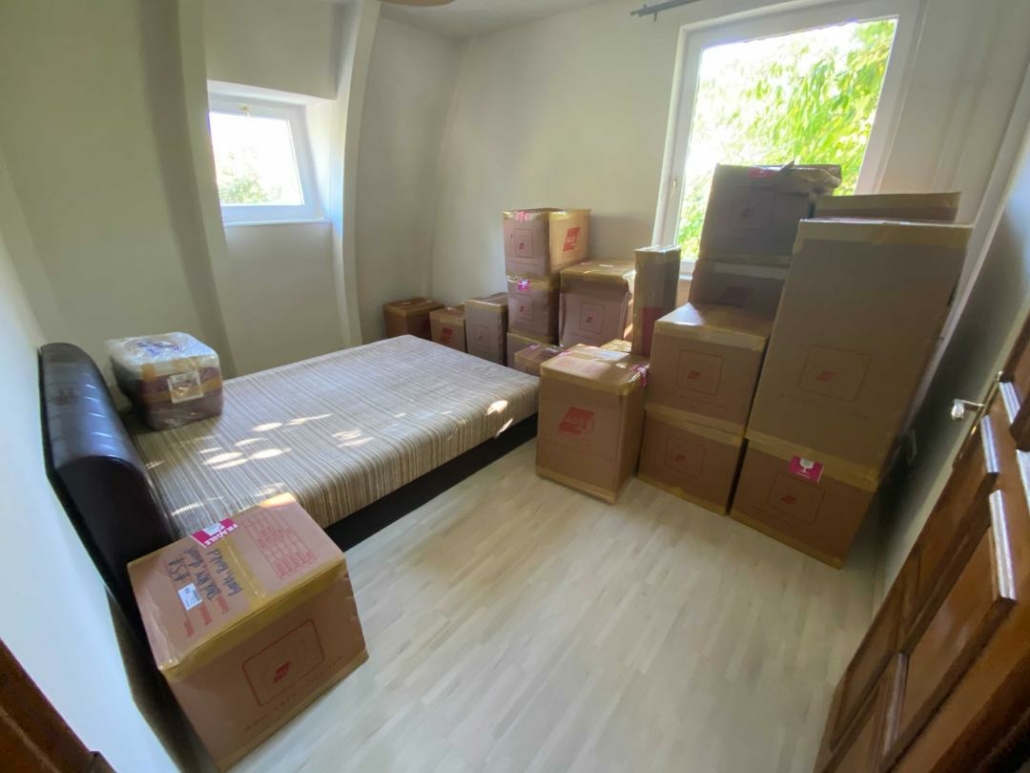Deciding what to ship when relocating is often more challenging than expected. With practical tips, we help you find the best way to sort, select, and ship your essentials.
As expats, we intermittently spend a large chunk of money shipping stuff around the world. The dilemma of what we should leave behind and what should form part of our precious shipping volume is fraught with complications.
As someone who has been on the Expat train for 19 years now and just experienced the arrival of our fourth shipping load a few days ago, I thought I’d share my thoughts on moving and the trials and tribulations of life before and after your shipping arrives. Are you actually happier with less before it arrives or after?
What goes
Our first move was back in 2003 from the UK to Kenya with our two young children, aged 5 and 7. We imagined we would go for the duration of the two-year contract to enjoy more sunshine and a few safaris. We ended up staying there nine years. When we asked our new boss-to-be how we should decide what we should or should not bring, he had a fabulous answer.
The people who come to Kenya and stay are those that bring enough stuff to make a home. Those who don’t make a home leave. Easy then.
We brought as many of our belongings as we could to make all four of us feel at home when we got there, and anything we wouldn’t need in Kenya or couldn’t bring we sold or stuffed in the attic to sort out later. Easier said than done. It was not a sellers’ market at the time, and it was very difficult to sell anything and get vaguely close to what it was worth.
My wife had recently inherited, from her brother, a ginormous TV (not a flat screen, but the old-style big screen and body). Imagine a TV the size of a Smart car but which weighs twice as much. Despite several conversations, which I came at from many different angles, I could not change my wife’s mind. That TV was ours; it was worth a lot of money and was coming with us.
I have plenty of my own quirks. I refuse to be separated from my unicycle despite riding it maybe twice in the last 18 years! Saudi Arabia was too concrete for unicycling (I’m not very good). Hanoi in Vietnam was also too built up. Maybe there will be more grass and opportunity to get back into the saddle in Budapest and my circus skills can get back on track…
What stays?
Old stuff. Broken stuff. Anything you haven’t used or worn in the last two years (easier said than done). Anything you can pass on or sell and buy new again where you are going. Anything you won’t need in your next destination.
I handed on to a friend an amazing, but heavy, one-man tent-come-camp bed, which had been brilliant when sleeping under the stars in the cold Arabian desert and when I had a car to transport it, but would have been useless in Vietnam, where our mode of transport became a moped. Leaving can be a great opportunity to give to people around you who materialistically have less and shed things that are no longer of use to you.
In Kenya, where people make a living out of caddying for golfers, it is almost unheard of for an expat to leave without donating his or her golf shoes, gear, or clubs. These people become part of your life. The school security guard we gave our TV to could not thank us enough, nor could the teaching assistants loaded up with children’s clothes and toys. Moving countries is a fabulous opportunity to clear out and scale down.
A chance to halve your wardrobe. For me and this latest move, it was a chance to get rid of those armpit-stained t-shirts, those boxer shorts where the elastic waist has long gone, and those socks that are more hole than sock. We also managed to shed half of our books.
We haven’t bought into the digital book arena yet. We love our books. My Ian Rankin and Stuart MacBride collections, the wildlife books, the favourites. When we eventually retire somewhere, we picture these books sitting on a shelf somewhere in a reading room, looking ordered, inviting, and comforting.
Life before the shipping arrives
There’s something to be said about the simple non-materialistic life you lead before your shipping arrives. When you land in your new country with just the 23 kg in your suitcase, you have very simple wardrobe decisions to make each day. There’s a lot of washing up to do to make sure those two IKEA cups, plates and glasses are available again for their next use.
We arrived in Budapest at the beginning of August in a heatwave, so I had one warm top. A hoodie. As September ended and temperatures started to drop, that hoodie got a lot of use. If I was cold, I put the hoodie on. No big decisions about which hoody, or whether to choose a jumper (and which jumper?) or a long-sleeve t-shirt or a jacket of some sort… just find THE hoodie and put it on. Simple. Luckily, I love that hoodie.
Similarly simple in the kitchen. What can I cook in the two pots I have while I wait for the casserole dishes, frying pans, wok and baking trays to arrive with our shipment? It turns out you can do everything. And after living with two mugs, two bowls, two plates, and two glasses for eight weeks, I ask myself if I really need all those mugs, wine glasses, cutlery, and dishes I am unpacking.
What were the things I was really happy to see?
The three wooden giraffes from Kenya. They each have a story and remind us of the amazing adventures we had in our nine years in Africa. The two battered stone dogs from Hanoi. Stone dogs can be seen outside many houses in Hanoi where they are placed to scare away evil spirits. My Leeds United mug. Tea always tastes better in my Mr. Leeds United number one fan mug. My cruiser skateboard.
I can’t wait for a dry day to try it out along the banks of the Danube. My guitar. Did I need any of the other piles of stuff I’d just had shipped 8,063 km from Hanoi to Budapest? An extra hoody to replace the one I’d been wearing every cold day thus far. But the rest?
For my wife, it was her father’s ashes in the pot her mum had made. And the giraffes and the stone dogs. The wooden table her best friend had given us as a wedding present. And the Maasai men’s candlesticks.
Life after the shipping arrived
Was my life really richer now that I had all my belongings? It was certainly more cluttered. More clothes, more shoes, more books, more DVDs, more knick-knacks from around the globe, more of our children’s artwork… But did this make my life richer and more fulfilling to have more of my stuff surrounding me? My initial reaction as more and more boxes appeared in the apartment was a foreboding sense of dread of having to pack it all up and move it all again someday, somewhere further down the line.
But, in other ways, my life does feel richer. It makes the house more familiar, more like a home. It helps me appreciate the life we lead and the places we have been and reiterates the point that the most important items in our shipment are personal and sentimental.
When we were leaving Vietnam and sorting out the shipping, the moving company guy kept mentioning insurance so if anything happened to our belongings, we could replace them like for like. But we can’t.
It’s not possible to replace a wooden giraffe you remember being the first, haggling for it on the beach in Mombasa on your first holiday out of Nairobi. Nor the vase your best man gave you on your wedding day, made in a famous pottery in St. Ives.
Many of the things we cart around the world have a personal, sentimental connection, are irreplaceable, and make our new place in our new destination a home. Wherever we move to in the world to live and work, that is our home. We don’t have another in the UK left empty until the holidays. Where we live is home.
So, the things that are important to each of us come with us. Each move brings a new opportunity to reassess what those important things are and to shed items on the periphery. I think we’re getting better at it, but I’ll let you know for sure the next time we move. And you can be assured that the unicycle will still make the cut.
By Byron Wood






